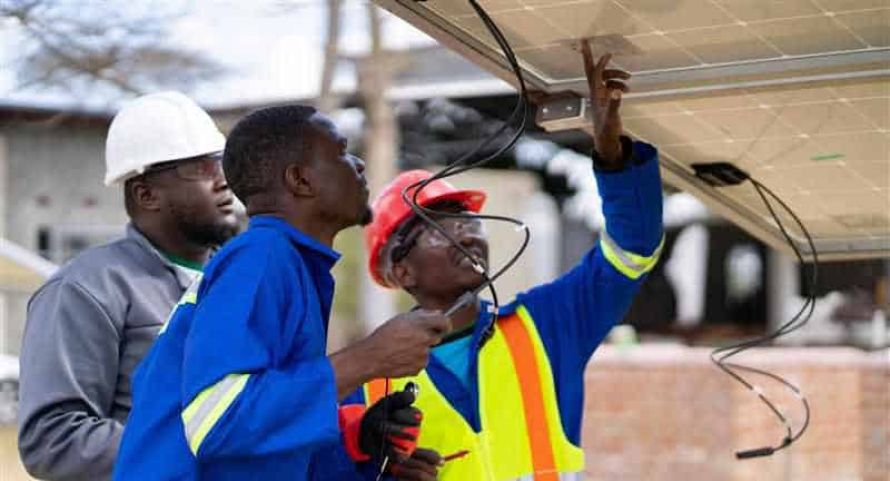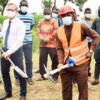Well-trained solar technicians accelerate electrification

With the help of solar energy, rural electrification in Zambia is making progress, especially in areas without connection to the national grid. Demand is rising. But there is a lack of well-trained solar technicians. In order to train them, Green People’s Energy in Zambia is committed to their education.
In Zambia, the sun shines for an average of 2,000 to 3,000 hours a year. On the other hand, just one in ten people living in rural areas has access to electricity. Solar energy is therefore a key to rural electrification and thus the chance for development. More and more municipalities, companies and organisations are therefore turning to solar power. The bottleneck for faster development is the lack of qualified solar technicians.
To better meet the growing demand, Green People’s Energy in Zambia (GBE) is helping to increase capacity for its Technical and Vocational Education and Training (TVET). As a first step, this requires more qualified trainers in the training centres. With its partners – the Fountain Gate Crafts and Trades School (FGCATS) and the Solar Energy Centre of the University of Zambia (UNZA-SEC) –, GBE has now successfully completed the first training of trainers for two newly developed solar courses. While the first course focused specifically on solar applications in agriculture and technologies such as solar dryers, pumps or irrigation systems, the second course trained solar applications outside agricultural topics.
16 participants from four public vocational training centres benefited from this intensive, four-week training. The aim of the training was to train them to be able to independently pass on the latest knowledge about these applications to their students at their institutions in the future.
16 participants show what they can do
They were trained by experts from the Fountain Gate Crafts and Trades School (FGCATS) and the Solar Energy Centre of the University of Zambia (UNZA-SEC). The programme covered the use, installation, repair and maintenance of solar systems. The training included practically oriented lessons. For example, they were able to practise installing an AC photovoltaic system, as well as mounting panels on a roof.
On the last day, they were allowed to prove their skills in a practical exam, supervised by the Zambian vocational training authority TEVETA. All passed the exam and can now call themselves certified experts in the installation of solar energy applications (in agriculture) and can teach the course at their own TVET college.
GBE provides equipment
In order for the Zambian training partners to be able to organise the training in a practical way, GBE handed over tools such as solar geysers and solar panels to both the trainers and the respective TVET colleges to be able to guarantee practical training before the start.
In the four training centres, the trained trainers will start the first training in the respective courses. These institutions include the Lusaka Business and Technical College, the Livingstone Institute of Business and Engineering Studies, the Saint Mawaggali Trades Training Institute and the Zambia College of Agriculture in Monze.
In Monze, Mundia Silumesii, having completed her course, will in future teach her students about solar applications in agriculture and sees solar energy as a beneficial source of energy: “Most smallholder farmers are not connected to the national grid because of the high cost. Solar energy, on the other hand, is readily available and cheap. The only costs are for the purchase and installation of the systems, after which there are usually no further expenses,” she says. She will now pass on the intensive training. “I have gained knowledge on solar energy applications that I will share with students and farmers in my training institution.”
Ebenezer Lyambai, a lecturer at Saint Mawaggali Trades Training Institute, emphasises the importance of TVET for training trainers and solar professionals. “Through the training, I have acquired skills such as solar system design, sizing and installation. This know-how will help me train solar professionals who can do quality and competent installations in the Zambian solar market. “
Internships strengthen the practical know-how of the 16 trainers
With the completion of the four-week intensive course, the training is not over for the 16 trainers. Instead, GBE, in cooperation with the Solar Industry Association of Zambia (SIAZ), enables them – before they train others – to get a taste of selected solar companies in Zambia and learn more about markets and products in these internships.
In total, GBE aims to train 260 solar professionals with its Zambian partners in order to accelerate the development of solar energy and contribute to the sustainable development of the sector with the help of qualified trainers and solar technicians.
144 student trainers have completed the courses
107 student trainers have completed their respective training in the installation of solar energy applications, and 37 student trainers have completed training for solar energy and agricultural applications.





